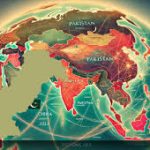Introduction
The world of celebrities is undergoing a massive transformation in 2025. With the rise of digital media, artificial intelligence, and global connectivity, fame is no longer limited to actors, musicians, or athletes—it is now being shaped by influencers, virtual avatars, and even AI-generated personalities. Hollywood, once the sole capital of global celebrity culture, is now sharing the stage with new powerhouses from Asia, the Middle East, and the digital universe. This shift is not only redefining stardom but also reshaping the entertainment industry, fan engagement, and the global perception of celebrity status.
The Rise of AI and Virtual Celebrities
One of the most groundbreaking changes in 2025 is the emergence of AI-generated celebrities. Virtual influencers with realistic appearances and carefully crafted personalities are gaining millions of followers on platforms like Instagram, TikTok, and YouTube. Unlike traditional celebrities, these AI stars never age, never get into scandals, and can be customized to suit brand campaigns perfectly.
In Hollywood, film studios are even experimenting with AI-generated actors to star in movies, raising ethical debates about human creativity and the role of technology in entertainment. Some argue that virtual celebrities could eventually replace humans in advertisements, music, and even acting, while others believe the authenticity of human expression will always prevail.
Middle Eastern Stars on the Global Stage
Hollywood is no longer the sole exporter of global celebrities. In 2025, Middle Eastern stars—actors, musicians, and influencers—are carving out a significant place on the international stage. Kuwait, Saudi Arabia, and the UAE have become cultural hubs producing stars who are redefining global entertainment. Streaming platforms like Netflix and Amazon Prime are increasingly featuring Middle Eastern dramas, giving regional actors unprecedented exposure.
This cultural diversification is reshaping global pop culture, making celebrity culture more inclusive and representative of different traditions, values, and lifestyles.
The Evolution of Fame in the Digital Era
Fame in 2025 is not achieved solely through movies or music. Social media remains a powerful platform, but it has evolved. Platforms like TikTok 3.0 and Meta’s immersive VR social spaces allow fans to interact with celebrities in virtual environments. Fans can attend concerts in the metaverse, sit in on virtual Q&A sessions, or even co-create content with their favorite stars.
The celebrity-fan relationship has become more personal and interactive. While this creates deeper engagement, it also raises concerns about privacy, burnout, and the blurring of boundaries between personal and public life.
Activism and Responsibility
Today’s celebrities are expected to be more than entertainers—they are expected to be activists, entrepreneurs, and role models. From climate change to social justice, stars are increasingly using their platforms to advocate for global causes. In 2025, celebrities who fail to take a stand on pressing issues risk alienating fans who expect accountability and authenticity.
This shift has made celebrity influence more politically charged than ever. Stars endorsing political candidates or speaking out on policy issues can spark international debates, highlighting the new power dynamics between entertainment and politics.
The Business of Celebrity in 2025
The celebrity economy has expanded beyond endorsements and ticket sales. Celebrities are now brand owners, tech entrepreneurs, and investors. Many stars are launching personal product lines, ranging from cosmetics and fashion to tech gadgets and wellness apps.
Digital collectibles like NFTs have also become a revenue stream, allowing fans to own exclusive digital content from their favorite stars. Moreover, the shift to streaming platforms has changed how stars earn money, as traditional box-office revenues are replaced by global digital royalties.
Challenges for Modern Celebrities
Despite new opportunities, the road to stardom in 2025 comes with challenges. The pressure of maintaining a flawless digital persona is immense, with cancel culture and online scrutiny waiting at every step. Privacy has become almost nonexistent for stars, as fans demand constant updates and access to their lives.
Mental health concerns are also growing among celebrities. The constant exposure, online bullying, and pressure to remain relevant in a fast-paced digital world have led many stars to openly discuss issues like anxiety and depression. This has sparked broader conversations about wellness in the entertainment industry.
FAQs
Q1: What are AI-generated celebrities?
AI-generated celebrities are virtual personalities created using artificial intelligence. They can appear in films, advertisements, and social media campaigns, and are gaining popularity in 2025.
Q2: How has social media changed celebrity culture in 2025?
Social media now includes immersive VR platforms where fans can interact with stars in virtual environments, making engagement more personal and interactive.
Q3: Are Middle Eastern celebrities gaining global recognition?
Yes, stars from Kuwait, Saudi Arabia, and the UAE are becoming increasingly popular worldwide through streaming platforms and cultural exports.
Q4: What challenges do celebrities face in 2025?
They face intense scrutiny, privacy concerns, and mental health challenges due to online pressure and constant exposure.
Q5: How do celebrities earn money today?
In addition to films and music, celebrities earn through product lines, NFTs, streaming royalties, and brand partnerships.
Conclusion
Celebrity culture in 2025 is unrecognizable compared to the past. AI-generated influencers, virtual interactions, and Middle Eastern stars are all reshaping what it means to be famous. The entertainment industry is no longer confined to Hollywood but has become a truly global and digital phenomenon.
While opportunities for engagement and monetization are greater than ever, challenges around privacy, mental health, and authenticity remain pressing. Celebrities today must balance artistry, activism, and entrepreneurship in a world where fame is both a powerful tool and a heavy burden.
Hollywood may still be the heart of global entertainment, but in 2025, celebrity culture belongs to the world—and increasingly, to the digital universe.








